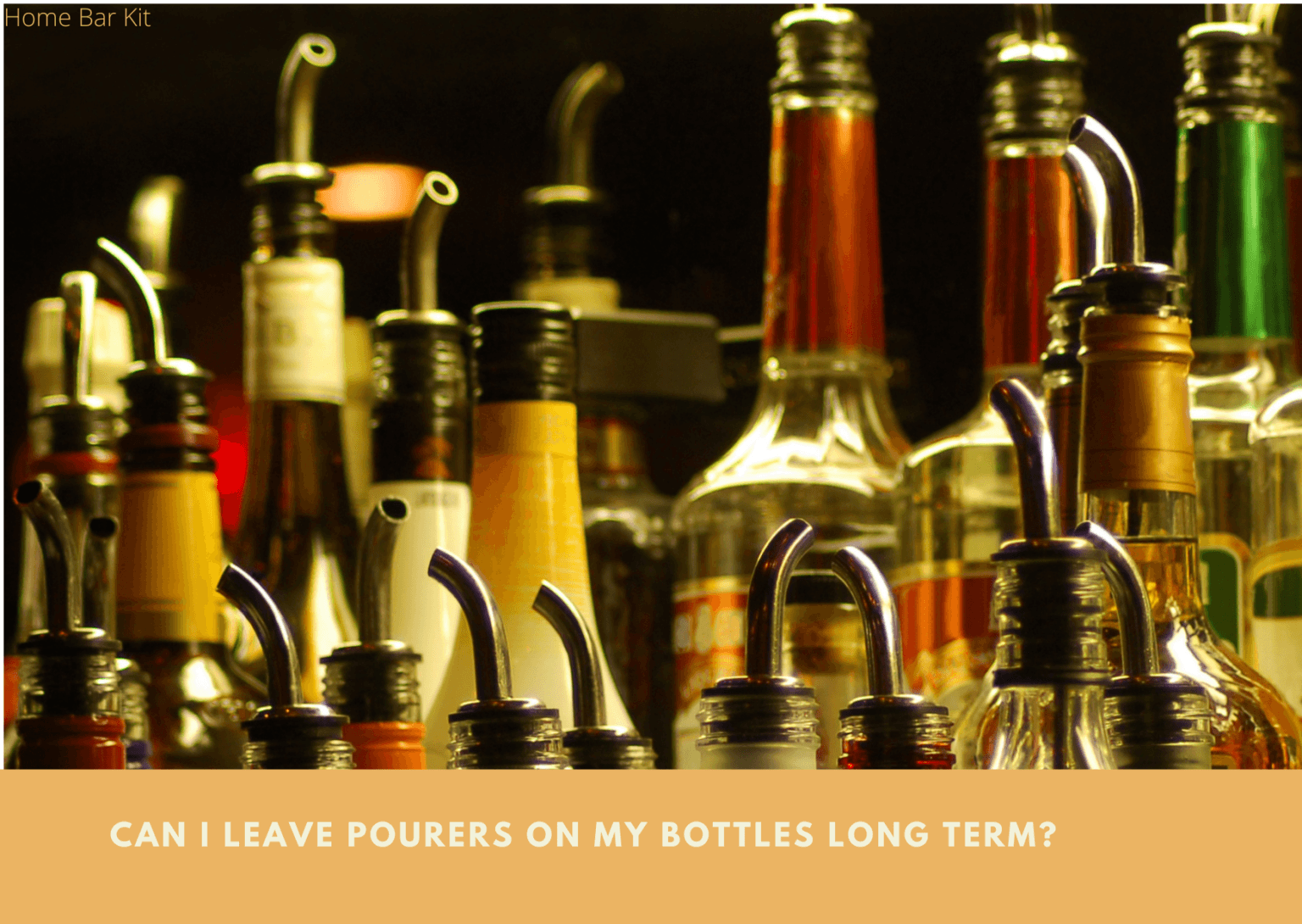At the end of the day, there’s much to be done to prepare the bar for the next opening. One of the more meticulous jobs to do is to individually clean the bottles so dust and other unwanted particles won’t accumulate. It also leaves you with a decision as to whether you’re leaving the liquor pourers on or not.
Yes, you can leave pourers on liquor bottles, but the better decision would be to remove or cover them to protect the contents. What’s going to happen to the liquors if the spout is still intact on the bottles? Read on to find out.
Generally speaking, it’s wise to remove pour spouts at the end of the night. Pourers that have no caps subject the alcohol to oxidation, which reduces its shelf life and degrades its flavor. The tiny bit of liquid left in the spout can also attract insects because of its sugar content.

Disadvantages of Leaving Liquor Pourers on
In the case of pourers with no caps, oxygen can freely make contact with the alcohol subjecting it to degradation and reducing its shelf life. It would be a waste when liquors lose their original taste and you are forced to dispose of them.
-
Liquors lose their alcohol content
If the bottles are exposed to heat such as from sunlight or spotlights, the evaporated liquid will escape through the hole of the spout. If this continues for some time, the liquor will slowly lose its alcohol content. Sweet liqueurs will also lose their flavor or sweetness.
Flavored alcohol and liqueurs can attract bugs, mostly fruit flies because of their sugar content. Insects will surely land on the spouts when left uncovered. They can lay their eggs, or end up in the liquor which may cause dismay to your customers when they see floating flies in their cocktails. Worse, if a health inspector catches a health hazard in your bar – you’ll be fined!
Dust and other unwanted particles don’t have a place in liquor spouts. If they happen to land in the bottles or just in the spout, it will pose some risks to your customers and may affect the business.
If you opt to leave the spouts on liquor bottles at all times but don’t want to get them dirty, you will have no choice but to buy caps to cover the spouts whenever the bar is closed. It will cost you more money especially if you decide to buy caps for all the liquor bottles.
Tips on Liquor Spouts: To Use or Not To Use
- Lesser used alcohols are better off with no pourers. Since they are rarely used, there’s no point putting liquor pourers on them. They won’t be exposed to air thus they won’t be wasted.
- Don’t use pourers on expensive liquors. You can’t risk ruining expensive alcohols by attaching pourers to them. Their original caps produce a better seal than pourers, even the capped ones, thereby prolonging their shelf life.
- Use pourers with caps to save money. Spare yourself from the dilemma and get liquor pourers that include caps to cover the spouts. Also, you won’t have to spend additional cash on buying separate caps for your standard pourers.
- Store your bottles away from heat. To alleviate the effects of oxidation, strategically store your liquor bottles away from sunlight or other sources of heat.
- Trap those bugs. You can make a DIY trap to lure the fruit flies to a specific area far from your precious alcohol. This will keep them at bay during the day.
Bar DOs and DON’Ts – What pour spouts should I use on my liquor?
FAQ
Will alcohol evaporate with a pour spout?
How do you keep bugs out of liquor bottles?
How long can you keep open liquor bottles?
How do you clean liquor pour spouts?
Can you leave pourers on liquor bottles?
It also leaves you with a decision as to whether you’re leaving the liquor pourers on or not. Yes, you can leave pourers on liquor bottles, but the better decision would be to remove or cover them to protect the contents. What’s going to happen to the liquors if the spout is still intact on the bottles? Read on to find out.
Does a speed pourer fit a 750 liter bottle?
Also called a liquor pourer or pour spout, a speed pourer is designed to fit into the neck of standard 750-milliliter liquor bottles (many do not fit liters). It’s secured by a series of plastic or rubber fins (often called the cork) that grab onto the interior glass.
How do you use a speed pourer?
Place the speed pourer in the bottle so that the pouring hole is facing the bottle’s label. This way, you’ll always know which way the hole is pointing. Hold the bottle by the neck or the main part of the bottle (whatever’s most comfortable for that bottle design) to tip it at a 45-degree angle when pouring.
Should you leave spouts on liquor bottles?
If you opt to leave the spouts on liquor bottles at all times but don’t want to get them dirty, you will have no choice but to buy caps to cover the spouts whenever the bar is closed. It will cost you more money especially if you decide to buy caps for all the liquor bottles. Lesser used alcohols are better off with no pourers.
